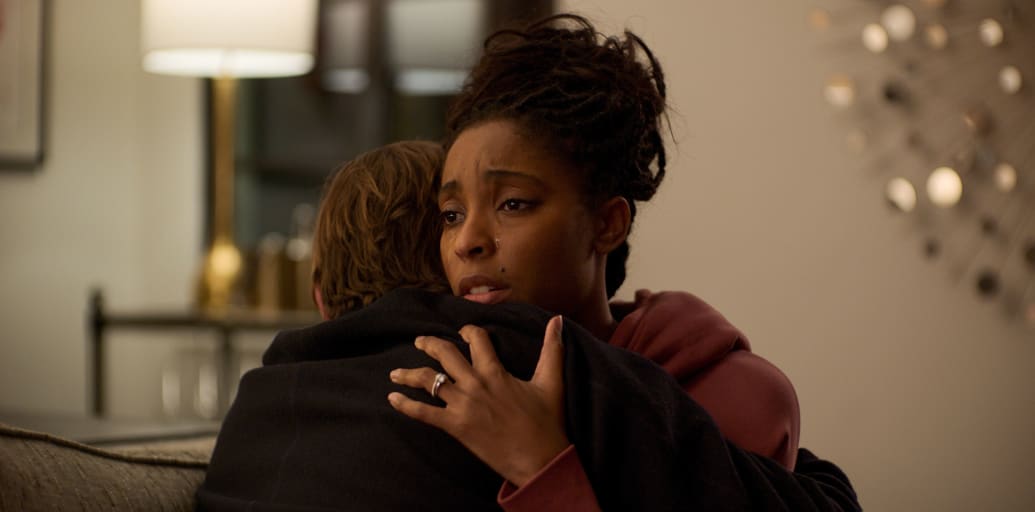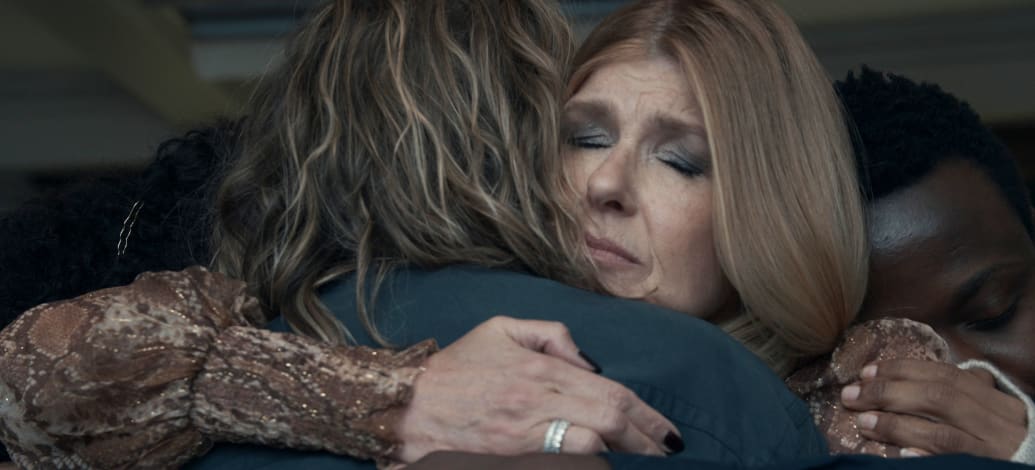After the events of the last three years, it is hardly surprising that television is fixating on therapeutic responses to trauma and grief.
Therapists on TV have come a long way in the 40 years since The Bob Newhart Show creators David Davis and Lorenzo Music avoided using the word “psychologist” when they pitched the sitcom to CBS. “We had to say personal counselor because the networks were nervous about mental health,” said Davis in a recent (ish) set-up, minus the killer doll. Not only does Lacey have to adjust to looking after a tween boy, but she is grieving her sister and several miscarriages. (“They forgot I am also the woman who lost my big sister,” she says.)

In the pre-crash snapshot in the first episode, Lacey’s denial runs deep regarding her attempts to get pregnant. Profound loss is part of her fabric, and group therapy away from her well-meaning husband gives her a place to share her sad story. The ripples of sorrow don’t need a big event to turn them into a tsunami, but it pushes Lacey’s dual heartache to the surface.
By this point, pretty much every form of therapy has been depicted on TV, whether group (see also: Dead to Me), couples’ or solo. Psychedelics in a controlled environment is another recent staple ranging from Diane Lockhart’s journey on The Good Fight to Nicole Kidman leading the unorthodox treatment as Masha in the batshit Nine Perfect Strangers. Loss factors heavily in the latter, but Dear Edward takes a more orthodox approach offering regular cupcakes instead of smoothies laced with mind-bending drugs.
Therapy is a savior in Shrinking and Dear Edward, whereas other recent Apple TV+ shows like The Shrink Next Door and Severance point to the more insidious side—or rather, those who use psychology and psychiatry at the detriment of others. Paul Rudd’s unpleasant Dr. Ike crosses every line in the doctor/patient dynamic to gaslight his way to wealth. Jimmy is far from predatory, but it is hard not to draw a line from The Shrink Next Door to the living arrangement in Shrinking, when Jimmy invites new patient Sean (Luke Tennie) to stay him, even if the motive is positive.
Neither has anything on the situation Steve Carell finds himself in as therapist Alan Strauss, in last year’s outstanding FX drama The Patient when serial killer Sam (Domhnall Gleeson) kidnaps Dr. Strauss to fix his murderous impulses. It is unrelenting and claustrophobic, but not without its enlightening moments amid the heavier trauma themes. One vital lesson Sam learns is the importance of allowing families to grieve and the process of saying goodbye, which points to growth in this dark and unusual circumstance.
Acceptance and avoidance are dueling states for many of these characters, but no one goes to the extremes of Mark (Adam Scott) in Severance in the wake of his wife’s death. Undergoing the severance procedure gives him eight hours a day to forget his sorrow. Yet, this denial attempt is an extreme version of Jimmy numbing his pain through booze and ignoring his responsibilities.
From a narrative point of view, it is easy to see why these types of stories, since the days of Bob Newhart’s friendly psychologist, are so appealing to creators and audiences alike. A therapy setting is a simple way to get various characters in one room who would otherwise go about their lives without forming connections with others experiencing similar bereavement circumstances.
Shrinking plays with the familiar one-on-one welcoming office set-up, but Jimmy steps outside this comfort zone when he decides to treat his patients outside this safe space. Co-creators Bill Lawrence and Brett Goldstein have tackled mental health and avoidance (and embracing) of therapy on Ted Lasso. Both shows could slot into the same world, and the darker themes in Ted Lasso’s second season reflect the bleaker landscape it was written in—whereas the first season finished filming pre-pandemic.
Dr. Sharon Fieldstone (Sarah Niles) is a sports psychologist who exists beyond her professional role in Ted Lasso, and Shrinking expands on how personal experience can impact a therapist’s work. Jimmy is held accountable by co-workers Paul (Harrison Ford) and Gabby (Jessica Williams), who add a workplace sitcom element that feels like a play on The Bob Newhart Show office setup. Except in this case, everyone is a therapist.

“Grief’s a crafty little fucker. It sneaks up on you,” Paul says in this week’s episode of Shrinking. He is talking to Jimmy’s teenage daughter Alice (Lukita Maxwell), offering his go-to method of getting it all out in one concentrated go: “I put on one of my favorite sad songs and just let myself grieve for 15 straight minutes.”
For Paul, it is Simon & Garfunkel who make him sob, for me watching Dear Edward and This Is Us is a version of this method. Plus, a TV show soundtrack is one way to elicit an ugly cry response with zero heavy lifting. Katims is an expert at gut-punch song and score choices—Explosions in the Sky still make my eyes instantly brim with tears—and the use of Sufjan Stevens in the Dear Edward pilot hits hard. (I might’ve uttered “Fuck you, Katims” through heavy sobs when this particular song began to play)
Memories of the dead cannot be pushed away by sad song therapy, and both Apple TV+ offerings underscore how the smallest of moments can trigger a recollection. Going alone will only prolong the pain, as Dear Edward and Shrinking demonstrate. A community has a stabilizing impact on those looking to find a semblance of reason in an uncontrollable world. The time spent on a plane puts strangers in close quarters with each other for a finite period, but in the case of the Trinity Airlines crash, the overlap is made permanent through those left behind.

At the first grief group session, pregnant Linda (Amy Forsyth) mistakes Dee Dee (Connie Britton) for the counselor. It is easy to understand why, as Dee Dee is the first one there, and she is setting up plates of baked treats. “I didn’t really expect a hug and a cupcake, but if this is therapy, I’m all in,” Linda announces before the actual group therapist arrives.
Britton reunites with Katims for the first time since Friday Night Lights, and this case of mistaken identity doubles as a nod to Tami Taylor’s high school counselor role. Her face is equally sympathetic, but Dee Dee’s marriage has skeletons about to tear her world apart even more than the crash did.
Britton steals every moment swinging wildly, from spiraling about a tree at her husband’s graveside to her response to Linda (“No, I’m not a therapist, I’m a griever”). She lacks awareness, is self-centered, and brings some much-needed levity through Britton’s line readings — though there are also some heartbreaking scenes. Dee Dee is a whirlwind, effectively showcasing how grief is chaos that is impossible to contain. The support network offered in this group (which begins with just six people) is an anchor in this storm.
Dear Edward and Shrinking, pinpoint how a shared traumatic experience bonds those left behind. One spotlights strangers finding solace in group counseling, and the other portrays a tight network of friends and colleagues ready to pick up the pieces. Making sense of loss is ongoing, and TV can respond quickly to the current landscape without offering an IRL pandemic play-by-play.
Television is not a therapy replacement, but Apple TV+ ensures crying is on the 2023 catharsis agenda.
Keep obsessing! Sign up for the Daily Beast’s Obsessed newsletter and follow us on Facebook, Twitter, Instagram and TikTok.



